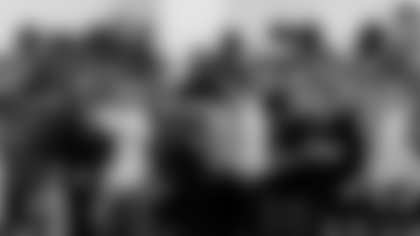NEW ORLEANS (AP) -For Sean Payton, writing a book gave him a chance to ``come clean.''
The truth is, the New Orleans Saints' head coaching job was not the one Payton really wanted back in 2006, and he had reservations about moving his family to a city that months earlier had been devastated by Hurricane Katrina.
I was really trying to paint an honest picture of my first day here, rather than say when I got off the plane I fell in love with it,'' Payton said Wednesday at an event to promote his first book,Home Team.''
Having gone to high school and college in the midwest, he was a longtime admirer of the Green Bay Packers, and their opening was the one he coveted. When he was passed over by the Packers, only then did he begin to envision himself coming to New Orleans.
Slated for release to the public on June 29, the book, co-written by Ellis Henican, describes how Payton ultimately realized that being part of a rebuilding effort in a city where passion for football runs as high as anywhere gave him a sense of purpose he could not have gotten elsewhere.
The lesson is really looking for where the opportunity is and where that opportunity finds you - and sometimes it's not always where you think you want it to be,'' Payton said.It might not be how you planned it, but it might be a better fit because truly there's maybe more of a need for you there.''
Payton said his book is primarily about the Saints' unique bond with their fans, and how it has been strengthened in the four seasons since Katrina, culminating with the club's first ever Super Bowl title last February.
Along the way, Payton recounts how he got into coaching after a playing career that was solid in college at Eastern Illinois but which floundered when he turned pro.
Payton rehashes his time with the New York Giants, where made his reputation as a top offensive assistant and went to his first Super Bowl before his relationship with then-head coach Jim Fassel soured.
Payton writes that he lost respect for Fassel when Fassel did not take the blame for ordering Payton to send in a risky pass play that resulted in an interception for a touchdown late in the first half of a game against Arizona; Payton wanted the Giants to take a knee.
I tried to really look at that in a very honest way because that step that I took there was the most important part of my career in that it provided me a city like New York to be an offensive coordinator,'' Payton said.Jim provided all those avenues for me. ... I was just trying to delicately think about, where's the exact truth here as I see it.''
Payton also describes his interviews with Al Davis when he was up for the Oakland Raiders' head coaching job after the 2003 season, and what led him to turn that opportunity down and remain an assistant in Dallas under Bill Parcells for two more seasons.
The book is written in a conversational style; Payton said he wanted readers to feel ``like they had five hours with me in an airport bar when our planes got delayed.''
Payton also writes about how he came to appreciate not just how much fans loved the team, but how they viewed the team's return - and its success - as a symbol of hope.
When he recounts the boisterous crowd packing the parade route the Saints took through downtown New Orleans after winning the Super Bowl, he writes, ``They were cheering for their team. They were cheering for their city. They were cheering for themselves. And we were cheering right back at them.''













